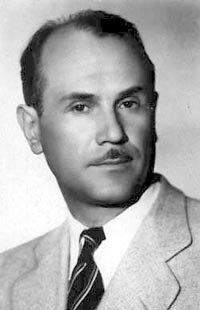Boris Babochkin (Boris Babochkin)

Actor, Director. He won international fame in the title role of “Chapaev” (1934), the most financially successful Soviet film of the 1930s. Babochkin’s commanding yet lovable performance raised the real-life Civil War hero to lasting status as a Russian pop culture icon. Boris Andreyevich Babochkin was born in Saratov, Russia. During the Civil War he served with the Red Army along the Volga and in the Urals under the command of Chapayev, although the two never met. After the war he studied acting in Moscow with Michael Chekhov and performed with stock companies throughout the country. From 1927 to 1940 he lived in Leningrad (now St. Petersburg), playing leading roles at the State Pushkin and Bolshoi Drama Theatres, and occasionally in films for the Lenfilm studio. His association with the latter led to his being cast in the coveted lead of “Chapaev”, based on the best-selling non-fiction book by Dmitri Furmanov. In the only known contemporary article about its production, the headstrong Babochkin admitted clashing with directors Sergei and Georgi Vasilyev over the interpretation of his character, and expressed regrets that “I couldn’t always win them over to my way of thinking”. “Chapaev” was a massive hit, seen by over 70 million people in the USSR alone, and was well-received abroad. It was also reputedly the favorite movie of dictator Josef Stalin. When the the Stalin Prizes were established in 1941, Babochkin was retroactively awarded one (first class) for his performance. He would appear in some two dozen other films, but he never came close to matching the success of “Chapaev” and remained essentially a man of the theatre, with over 200 roles to his credit. From 1937 to 1940 he was artistic director of the Bolshoi Drama Theatre, boldly stepping in for his friend, actor-director Alexey Dikiy, who had been arrested in the political purges. During World War II Babochkin settled in Moscow, making several dangerous trips to besieged Leningrad to perform for the struggling population. From 1946 until his death he taught an acting class at the State Institute of Film (VGIK) and from 1955 was a permament member of the Maly Theatre. His short stint as artistic director of Moscow’s Pushkin Theatre (1952 to 1953) brought Babochkin his greatest controversy. After Stalin’s death in 1953 he mounted a revival of Saltykov-Shchedrin’s 19th Century satire “Shadows”, with himself playing a corrupt Czarist bureacrat, and invited Alexei Dikiy (back from the gulag) to direct it. Critics interpreted the show, probably correctly, as a veiled attack on the current regime. It was promptly banned, Dikiy never worked again, and Babochkin had his career suspended until he formally apologized to the Communist Party. But the enduring fame he won for “Chapaev” was too widespread for him to be kept in the cultural wilderness for long. He was named People’s Artist of the USSR in 1963, and the following year he appeared on a Soviet postage stamp commemorating the 30th anniversary of his one great movie hit. On his 70th birthday in 1974, Babochkin received the Order of Lenin and was named Hero of Socialist Labor for his life’s work. He suffered a fatal heart attack while driving down a Moscow street, managing to safely pull his car over before collapsing. In 1977 he was posthumously awarded the USSR State Prize for his final screen appearance, in “The Escape of Mr. McKinley”. (bio by: Bobb Edwards) Family links: Spouse: Ekaterina Mikhaylovna Babochkina (1906 – 1988)* *Calculated relationship
Born
- January, 18, 1904
Died
- July, 07, 1975
Cemetery
- Novodevichy Cemetery
- Russia

